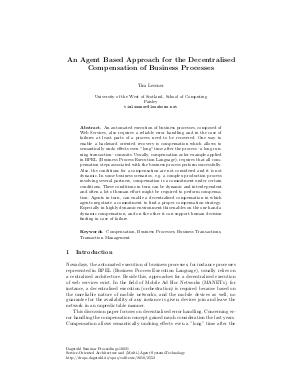An Agent Based Approach for the Decentralised Compensation of Business Processes
Author Tim Lessner
-
Part of:
Volume:
Dagstuhl Seminar Proceedings, Volume 10021
Part of: Series: Dagstuhl Seminar Proceedings (DagSemProc) - License:
 Creative Commons Attribution 4.0 International license
Creative Commons Attribution 4.0 International license
- Publication Date: 2010-11-29
File

PDF
DagSemProc.10021.4.pdf
- Filesize: 137 kB
- 6 pages
Document Identifiers
Subject Classification
Keywords
- Compensation
- Business Processes
- Agents
- Commitment
Metrics
- Access Statistics
-
Total Accesses (updated on a weekly basis)
0Document
0Metadata
Abstract
An automated execution of business processes, composed of Web Services, also requires a reliable error handling and in the case of failures at least parts of a process need to be recovered. One way to enable a forward oriented recovery is compensation which allows to semantically undo effects even "long" time after the process --a long running transaction-- commits. Usually, compensation as for example applied in BPEL (Business Process Execution Language), requires that all compensation steps associated with the business process perform successfully. Also, the conditions for a compensation are not considered and it is not dynamic. In some business scenarios, e.g. a complex production process involving several partners, compensation is a commitment under certain conditions. These conditions in turn can be dynamic and interdependent. Often, a lot of human effort is required to perform compensation. Agents in turn, can enable a decentralised compensation in which agents negotiate a commitment to find a proper compensation strategy. Especially in highly dynamic environment this enables on the one hand a dynamic compensation, and on the other it can support human decision finding in case of failure.
Cite As Get BibTex
Tim Lessner. An Agent Based Approach for the Decentralised Compensation of Business Processes. In Service-Oriented Architecture and (Multi-)Agent Systems Technology. Dagstuhl Seminar Proceedings, Volume 10021, pp. 1-6, Schloss Dagstuhl – Leibniz-Zentrum für Informatik (2010)
https://doi.org/10.4230/DagSemProc.10021.4
BibTex
@InProceedings{lessner:DagSemProc.10021.4,
author = {Lessner, Tim},
title = {{An Agent Based Approach for the Decentralised Compensation of Business Processes}},
booktitle = {Service-Oriented Architecture and (Multi-)Agent Systems Technology},
pages = {1--6},
series = {Dagstuhl Seminar Proceedings (DagSemProc)},
ISSN = {1862-4405},
year = {2010},
volume = {10021},
editor = {Monique Calisti and Frank P. Dignum and Ryszard Kowalczyk and Frank Leymann and Rainer Unland},
publisher = {Schloss Dagstuhl -- Leibniz-Zentrum f{\"u}r Informatik},
address = {Dagstuhl, Germany},
URL = {https://drops.dagstuhl.de/entities/document/10.4230/DagSemProc.10021.4},
URN = {urn:nbn:de:0030-drops-25527},
doi = {10.4230/DagSemProc.10021.4},
annote = {Keywords: Compensation, Business Processes, Agents, Commitment}
}
